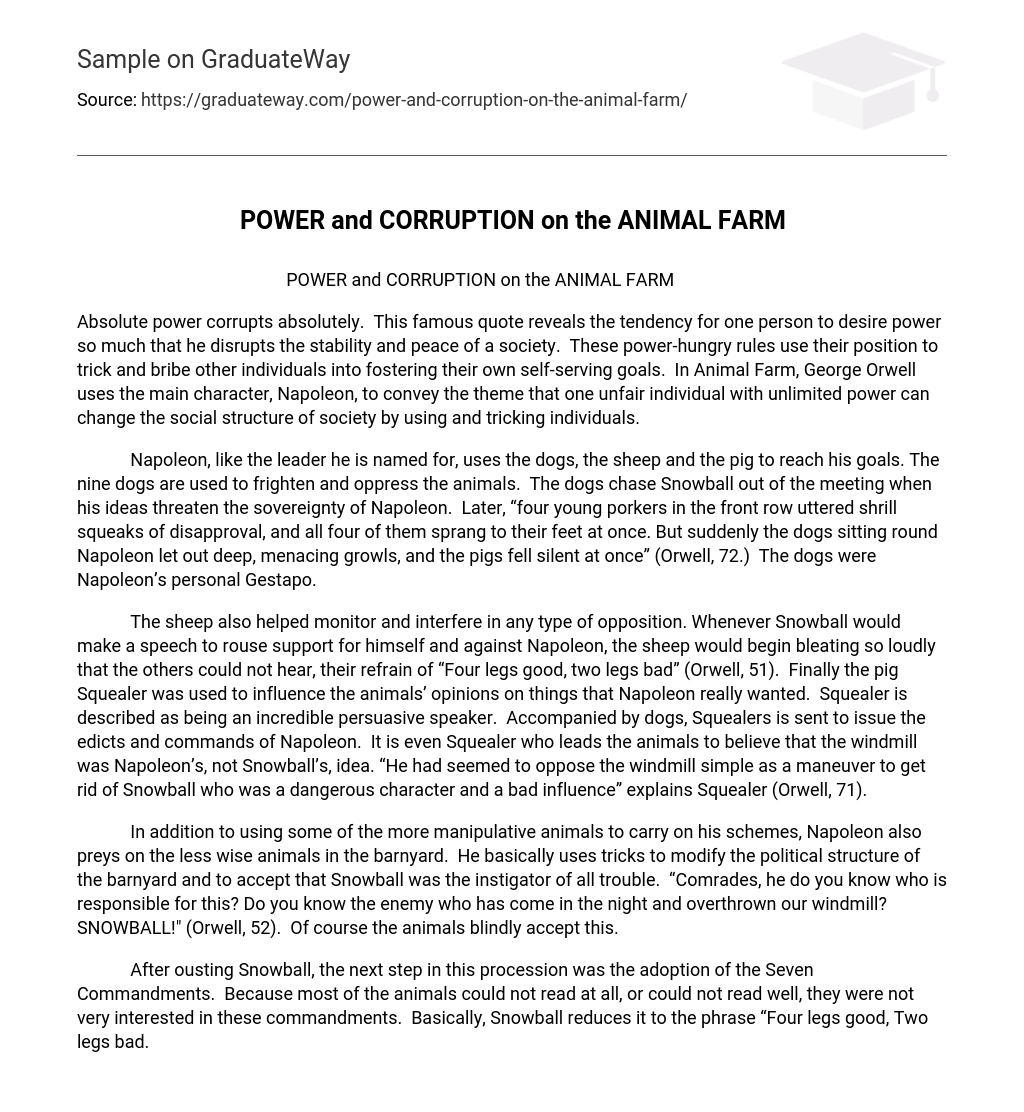Absolute power corrupts absolutely. This famous quote reveals the tendency for one person to desire power so much that he disrupts the stability and peace of a society. These power-hungry rules use their position to trick and bribe other individuals into fostering their own self-serving goals. In Animal Farm, George Orwell uses the main character, Napoleon, to convey the theme that one unfair individual with unlimited power can change the social structure of society by using and tricking individuals.
Napoleon, like the leader he is named for, uses the dogs, the sheep and the pig to reach his goals. The nine dogs are used to frighten and oppress the animals. The dogs chase Snowball out of the meeting when his ideas threaten the sovereignty of Napoleon. Later, “four young porkers in the front row uttered shrill squeaks of disapproval, and all four of them sprang to their feet at once. But suddenly the dogs sitting round Napoleon let out deep, menacing growls, and the pigs fell silent at once” (Orwell, 72.) The dogs were Napoleon’s personal Gestapo.
The sheep also helped monitor and interfere in any type of opposition. Whenever Snowball would make a speech to rouse support for himself and against Napoleon, the sheep would begin bleating so loudly that the others could not hear, their refrain of “Four legs good, two legs bad” (Orwell, 51). Finally the pig Squealer was used to influence the animals’ opinions on things that Napoleon really wanted. Squealer is described as being an incredible persuasive speaker. Accompanied by dogs, Squealers is sent to issue the edicts and commands of Napoleon. It is even Squealer who leads the animals to believe that the windmill was Napoleon’s, not Snowball’s, idea. “He had seemed to oppose the windmill simple as a maneuver to get rid of Snowball who was a dangerous character and a bad influence” explains Squealer (Orwell, 71).
In addition to using some of the more manipulative animals to carry on his schemes, Napoleon also preys on the less wise animals in the barnyard. He basically uses tricks to modify the political structure of the barnyard and to accept that Snowball was the instigator of all trouble. “Comrades, he do you know who is responsible for this? Do you know the enemy who has come in the night and overthrown our windmill? SNOWBALL!” (Orwell, 52). Of course the animals blindly accept this.
After ousting Snowball, the next step in this procession was the adoption of the Seven Commandments. Because most of the animals could not read at all, or could not read well, they were not very interested in these commandments. Basically, Snowball reduces it to the phrase “Four legs good, Two legs bad.” However, Napoleon modifies the Commandments to first allow pigs to sleep in beds (just without sheets). He continues to modify the commandments until they are reduced to one, “All animals are created equal, and some are more equal than others.” Of course, at this point, the propaganda has worked.
Napoleon has managed to change the structure of the farm in other ways. He takes the young from their parents to indoctrinate them much in his way only. He systematically executes those who help Snowball or who oppose him. He abolishes meetings and committees in favor of his own proclamations issued forth by the orator Squealer. Pretty soon, nobody remembers the good old days, except one or two old timers. The farm runs efficiently so nobody makes waves. In this way, Napoleon is following the path of several of our history’s dictators. Even the animals have taken to calling him “Our leader, Comrade Napoleon” or “Father of all Animals.” Through his megalomania, usury and trickery, Napoleon rises to god-like status on the animal farm.





